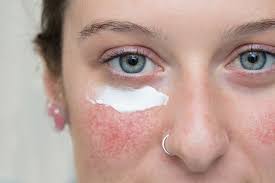
Blotchy Skin
Blotchy skin, also known as mottled skin, is a common concern for many people, affecting various parts of the body and face. A splotchy face can cause emotional distress and can be embarrassing. Tinted sunscreens can help cover the red patches, but it is best if you can get on the right skincare routine to return your skin to an even color.
As a dermatologist, there are many things for me to consider that may be causing your blotchy skin. I will try to help you understand the causes and how to treat your mottled skin to achieve a clearer, more even-toned complexions. In this blog post, we will explore the various factors that contribute to blotchy skin and discuss effective treatment options.
If you have red patches on your face, taking our skin type quiz to determine which of the 16 Baumann Skin Types you are- can also help us give you skincare advice that is more customized to your skin issues.
Mottled, Blotchy, and Splotchy Skin
The most common cause of a blotchy face is inflammation. This can be caused by many things.
The 5 most common causes of a mottled blotchy face are:
Rosacea
Allergic reaction
Seborrheic Dermatitis
Menopause Hot Flash
Razor Rash
This blog will discuss blotchiness of the face and then will cover causes of blotchiness on the body. Treatments will always include: treating the cause and using soothing anti-inflammatory skincare.
What is Blotchy Skin?
Blotchy skin, or mottled skin, is characterized by irregular patches of discoloration on the skin. These patches may appear red, pink, brown, or blue, depending on the underlying cause. Blotchy skin can affect any part of the body but is most commonly seen on the face, neck, chest, and arms. The condition may be temporary or chronic and can be caused by various factors, including sun exposure, temperature changes, hormones, and certain medical conditions.
Causes
Causes of Blotchy Skin on the Face
There are many causes of blotchy skin. In most cases it is a temporary concern, but in some cases it is more serious. These are some of the causes of blotchy skin on the face.
Sun Exposure
Prolonged exposure to UV rays can cause damage to the skin, leading to uneven pigmentation and blotchiness. Sun exposure also make the face flush due to heat or loss of the ability of the capillaries to contract resulting in facial mottling and telangiectasias (Broken capillaries or spider veins). Its one of many reasons to wear a daily SPF. However, some chemical sunscreens can worsen blotchiness, so choose a mineral sunscreen such as one on this list.
Hormonal Changes
Fluctuations in hormones, particularly during pregnancy or menopause, can cause melasma, a condition characterized by brown or gray-brown patches on the face. Hormonal changes can stimulate melanocytes, leading to increased pigment production in localized areas. Pregnancy-related melasma, also known as the “mask of pregnancy,” commonly appears on the cheeks, forehead, nose, and upper lip. Menopause-related melasma may be triggered by the decline in estrogen levels, which can affect skin pigmentation and cause blotchiness.
Acne
Inflammatory acne lesions can cause post-inflammatory hyperpigmentation, resulting in dark spots and uneven skin tone on the face. When acne lesions become inflamed, they can damage the surrounding skin tissue, leading to the release of pigment and the formation of dark spots. This is particularly common in individuals with darker skin tones, as their melanocytes are more reactive to inflammation. Post-inflammatory hyperpigmentation can persist long after the acne lesions have healed, contributing to a mottled and uneven complexion.
Rosacea
This chronic skin condition causes redness, visible blood vessels, and sometimes small, red, pus-filled bumps on the face. Rosacea occurs when blood vessels in the face become enlarged and more visible, leading to a flushed and uneven appearance. Triggers such as sun exposure, stress, spicy foods, and hot beverages can cause flare-ups, exacerbating the blotchy appearance of the skin. Over time, rosacea can worsen. This chronic inflammatory condition has been associated with other diseases linked to inflammation such as heart disease and diabetes.
Seborrheic Dermatitis
This common skin condition causes scaly patches, red skin, and stubborn dandruff. It usually affects oily areas of the body, such as the scalp, face, and chest. Seborrheic dermatitis can cause pink to red patches covered with greasy-looking scales, which can contribute to a blotchy and uneven skin appearance. The exact cause of seborrheic dermatitis is unknown, but factors such as hormones, genetics, and microorganisms like yeast may play a role in its development.
Causes of Blotchy Skin on Body
These more serious disorders can cause blotchy skin on the face, neck, arms, legs and trunk. If you have persistent blotchiness that does not improve with soothing skincare, it is a good idea to schedule an appointment with your dermatologist to rule out any serious conditions.
Dermatomyositis
This rare inflammatory disease causes muscle weakness and a distinctive skin rash that can appear patchy or blotchy. The rash associated with dermatomyositis often appears as a purple or red discoloration on the eyelids, cheeks, nose, back, shoulders, and other sun-exposed areas. It may also cause swelling and changes in skin texture, such as roughness or scaliness. The exact cause of dermatomyositis is unknown, but it is thought to be an autoimmune disorder in which the body’s immune system attacks its own tissues.
Lupus
Lupus is a chronic autoimmune disease that can cause a wide range of symptoms, including skin problems. The most common skin manifestation of lupus is a butterfly-shaped rash that appears across the cheeks and nose, known as a malar rash. This rash can be red, raised, and scaly, contributing to a blotchy and uneven skin appearance. Other skin problems associated with lupus include photosensitivity (increased sensitivity to sunlight), hair loss, and sores or ulcers in the mouth or nose. Lupus occurs when the body’s immune system attacks its own tissues and organs, leading to inflammation and damage.
Treating Blotchy Skin
The treatment for blotchy skin depends on the underlying cause. Some general treatment options include:
Sun Protection: Using a broad-spectrum sunscreen with an SPF of at least 30 can help prevent further sun damage and reduce the appearance of blotchy skin.
Topical Treatments: Depending on the cause, topical medications such as hydroquinone, tretinoin, or azelaic acid may be prescribed to even out skin tone and reduce discoloration. Topical anti-inflammatory ingredients can be used to soothe red skin.
Laser Therapy: Intense pulsed light (IPL) or fractionated laser treatments can help improve the appearance of blotchy skin by targeting specific pigments or blood vessels.
Oral Medications: In some cases, oral medications such as antibiotics or anti-inflammatory drugs may be necessary to treat underlying conditions like rosacea or vasculitis.
Lifestyle Changes: Avoiding triggers such as excessive sun exposure, stress, or certain foods can help manage conditions like rosacea and hives.
See your dermatologist if you have persistent blotchiness on the body. Concerning signs include:
If your skin gets upset every time you go in the sun
You have muscle weakness
Other systemic symptoms
Abnormal ANA on blood test
If you only have occasional blotchiness on the face, it is more likely due to one of the issues that cause inflammation on the face discussed above. Our skin type quiz can help you find products to soothe blotchy skin on the face, taking into account your individual skin concerns and needs. By identifying your skin type and the underlying causes of your blotchy complexion, we can recommend targeted treatments and skincare products that can help even out your skin tone and improve your overall skin health. If you do not improve with the proper skin care, see your doctor for an assessment and advice. Visit AAD.org to find a board certified dermatologist near you.


